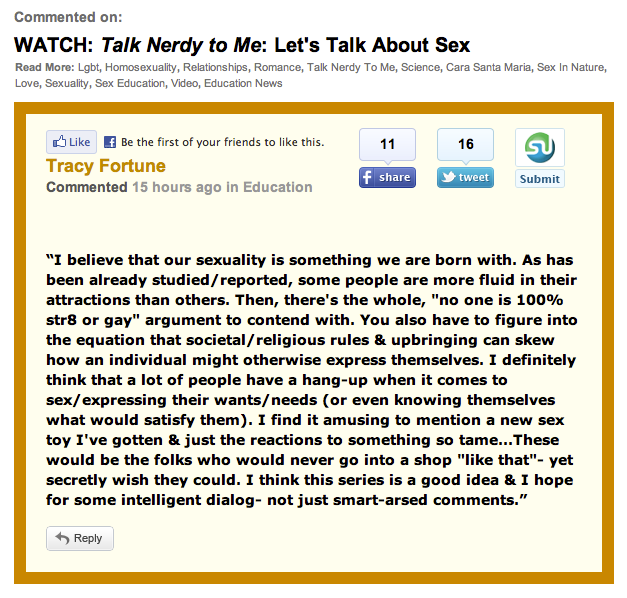
First and foremost, I want to thank you all for your comments and questions left here on the blog and via Facebook and Twitter following yesterday's post, "Let's Talk About Sex." Many of you brought up valid points that I am quite interested in discussing further. Today, I thought it would be a good idea to focus on the question of whether or not sexuality is innate.
In order to have a reasonable discussion, I think we all need to agree on a good operational definition of what sexuality and innate really mean. Mosby's Medical Dictionary defines sexuality as "the sum of physical, functional, and psychologic attributes that are expressed by one's gender identity and sexual behavior, whether or not related to the sex organs or procreation." Something that is innate is, of course, possessed at birth, inborn, inherent, congenital, and hereditary. The question at hand, then, is sexuality innate? is really a nature vs. nurture discussion of whether or not sexual orientation, sexual attitudes, sexual proclivities, etc. have a strong biological, physiological, and genetic component and/or whether the environment and personal experience contribute to shaping these things.
As a brief aside, I think it's important to mention that in old medical and psychology textbooks (published prior to about 1970) sexuality was rarely discussed. When it was mentioned, the language was very man-centric. At that time, male pronouns referred to both genders. Mankind meant humankind. Men meant people. Although this was arguably just a grammatical convention of the time, it was reflected by the fact that female attitudes and sexual responses were basically left out of the conversation. The same was true for gay, lesbian, bisexual and transgender attitudes. When discussed, they were viewed as a dysfunction or perversion if discussed at all.
Conventional wisdom in the old-school psychological sciences was that homosexuality was caused by nurture. Overbearing mothers and distant fathers were thought to induce homosexual tendencies in children, according to early psychoanalytic theory. Today, this is a laughable assumption, rooted firmly in nothing. No published studies support this claim. In fact, recent studies are revealing that genes, environment, brain structure, and hormones all seem to have a mixed role in sexual orientation and preferences. We know that sexuality has a strong physiological component, and we can study this through twin studies, investigation of genetic markers, and exploration of sexual orientation and behavior in nature (animals in the wild or captivity).
To end today's discussion, I want to draw everyone's attention to a comment left by HuffPost community member Tracy Fortune (see image below).

I hope this comment inspires more of you to join in the conversation. Tomorrow, lets continue the nature-nurture discussion about human sexuality by taking at look at some recent evidence-based conclusions.
See all Talk Nerdy to Me posts: www.huffingtonpost.com/news/talk-nerdy-to-me
Like Cara Santa Maria on Facebook: www.facebook.com/pages/Cara-Santa-Maria